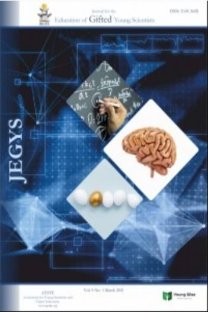Gifted Education in Science and Chemistry: Perspectives and Insights into Teaching, Pedagogies, Assessments, and Psychosocial Skills Development
This article provides gifted education perspectives and creative insights with a particular focus on chemistry and science, and discusses associated teaching, learning, pedagogies, curriculum developments and assessments in the context of gifted education. The article emphasizes the cluster grouping approach, hidden curriculum, mentoring and proper counselling provisions in school that may significantly impact on gifted students’ developments. The article discusses gifted students’ psychosocial skills development to achieve their eminence. The implicated issues surround the development of psychosocial skills are discussed. The article sheds light on the cultural aspects of gifted education as the gifted students representing diverse cultural backgrounds encounter cognitive conflicts which affect their science learning and psychosocial skills development.
Keywords:
gifted education, chemistry, science, teaching, pedagogy, assessment, curriculum culture and psychosocial skills,
___
- Allchin, D. (1999). Values in Science: An Educational Perspective. Science & Education, 8(1), 1-12. doi: 10.1023/A:1008600230536
- Brady, L., and Kennedy, K. (2012). Assessment and Reporting, Celebrating student achievement (4th Ed. ed.): Frenchs Forest, NSW: Pearson.
- Costa, V. B. (1995). When science is “another world”: Relationships between worlds of family, friends, school, and science. Science Education, 79(3), 313-333. doi: 10.1002/sce.3730790306.
- Driver, R. (1988). Theory into practice II: A constructivist approach to curriculum development. In P. J. E. Fensham (Ed.), Development and Dilemmas in Science Education (pp. 133-149): London: Falmer Press.
- Ewing, R. (2010). Towards some Definitions Curriculum and Assessment: A Narrative Approach (pp. 1-19). South Melbourne: Oxford University Press.
- Freire, P. (1972). Pedagogy of the oppressed. (pp. 45-59). London: Penguin.
- Gabel, D. (1985). Chemistry for gifted children in the intermediate grades. Journal of Chemical Education, 62(8), 702. doi: 10.1021/ed062p702
- Greco, T. G. & Greco, C. B. (1987). A hands-on introduction to chemistry for gifted students in the intermediate grades. Journal of Chemical Education, 64(6), 537. doi: 10.1021/ed064p537
- Gross, M.U.M. (2004). Exceptionally gifted children (2nd ed.): London: Routledge Falmer.
- Hammond L-D., Austin, K., Orcutt, S., & Rosso, J. (2001). How people learn: Introduction to learning theories. 1-22. Retrieved from http://www.stanford.edu/class/ed269/hplintrochapter.pdf website: http://www.stanford.edu/class/ed269/hplintrochapter.pdf
- Hoekman, K. (1994). Silverman: A New Perspective of Giftedness. Gifted (82(April)), 21-22.
- Jegede, O. J. (1995). Collateral Learning and the Eco-Cultural Paradigm in Science and Mathematics Education in Africa. Studies in Science Education, 25(1), 97-137. doi: 10.1080/03057269508560051
- Jegede, O. J. and Aikenhead, G. S. (1999). Transcending cultural borders: Implications for science teaching. Research in Science & Technological Education, 17(1), 45-66.
- Kempa, R. (1986). Review of assessment techniques Assessment in science (pp. 19-34). Cambridge, U.K.: Cambridge University Press.
- Lang, Q. C., Wong, A. F. L. and Fraser, Barry J. (2005). Teacher-Student Interaction and Gifted Students' Attitudes toward Chemistry in Laboratory Classrooms in Singapore. The Journal of Classroom Interaction, 40(1), 18-28.
- Latour, B. and Woolgar, S. (1979). Laboratory Life. The Contruction of Scientific Facts. Princeton, New Jersey: Princeton, New Jersey: Princeton University Press.
- McCluskey, K. W., & Mays, A. M. (Eds.). (2003). Mentoring for talent development. Sioux Falls: SD: Reclaiming Youth International, Augustana College.
- McCluskey, K. W.; O'Hagan, S.; Baker, P. and Richard, S. (2000). Nurturing the talents of Aboriginal Canadian youth. TalentEd, 18(4), 1-9.
- McInerney, D and McInerney, V. (2010). Effective Teaching and Learning in Educational Psychology: Constructing learning (pp. 2-34): Frenchs Forest: Pearson.
- McLeod, J. (2011). Educating society: sociological debates and dilemmas Public Sociology: An Introduction to Australian Society (2nd ed. ed., pp. 437-459): Allen & Unwin.
- Munro, J. (2011). Submission to Victorian Parliamentary Inquiry into the education of Gifted and Talented Students (pp. 1-20). http://www.parliament.vic.gov.au/images/stories/committees/etc/Past_Inquiries/EGTS_Inquiry/Submissions/96_Dr_John_Munro.pdf (accessed on 03 February 2016)
- Phelan, P., Davidson, A. L. and Cao, H. T. (1991). Students' Multiple Worlds: Negotiating the Boundaries of Family, Peer, and School Cultures. Anthropology & Education Quarterly, 22(3), 224-250. doi: 10.2307/3195764
- Plunkett, M. and Kronborg, L. (2007). Gifted Education in Australia: A Story of Striving for Balance. Gifted Education International, 23(1), 72-83. doi: 10.1177/026142940702300109
- Roberts, D. A. (1982). Developing the concept of “curriculum emphases” in science education. Science Education, 66(2), 243-260. doi: 10.1002/sce.3730660209
- Rogers, K. B. (2002). Re-forming Gifted Education: Matching the Program to the Child: Scottsdale, AZ: Great potential press.
- Schulz, S. (2005). The Gifted: Identity Construction through the Practice of Gifted Education. International Education Journal Special Issue, 5 (5), 117-128.
- Silverman, L. (2009). What we have learned about gifted children 1979-2009. http://www.gifteddevelopment.com/What_is_Gifted/learned.htm (accessed on 05 October 2015)
- Silverman, L.K. (Ed.). (1993). Counselling the gifted and talented: Denver: Love Publishing Co.
- Sternberg, R. J. (1998). Abilities Are Forms of Developing Expertise. Educational Researcher, 27(3), 11-20. doi: 10.3102/0013189x027003011
- Subotnik, R. F., Olszewski-Kubilius, P. and Worrell, Frank C. (2011). Rethinking Giftedness and Gifted Education: A Proposed Direction Forward Based on Psychological Science. Psychological Science in the Public Interest, 12(1), 3-54. doi: 10.1177/1529100611418056
- United Nations Educational Scientific and Cultural Organization. (1991). Values and ethics and the science and technology curriculum. (pp. 1-117). Bangkok: Asia and the Pacific Programme of Educational Innovation for Development.
- Watters, J. J. and Diezmann, C. M. (2003). The gifted student in science: fulfilling potential. Australian Science Teachers Journal, 49(3), 46-53.
- Williams, D., Johnson, B., Peters, J. and Cormack, P. (1999). Assessment: From Standardised to Authentic Approaches: Katoomba, NSW: Social Science Press.
- Wood, D. (2009). Project Gifted: Using a project-based approach to developing teacher understanding of gifted education. The Australasian Journal of Gifted Education, 18(1), 48-55.
- Başlangıç: 2013
- Yayıncı: Genç Bilge Yayıncılık
